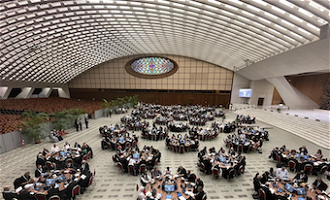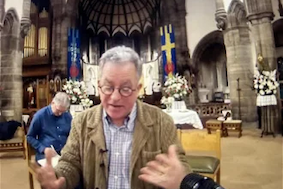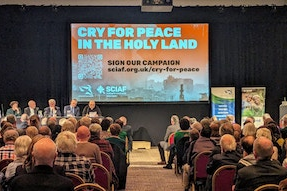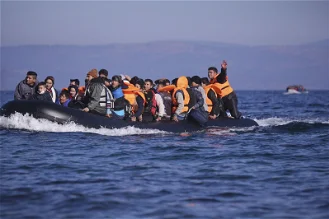Synod: Peace prayers, first woman chair

Source: Vatican News
The 340 participants of the Synod held a minute's silence at their meeting in the Pope Paul VI Hall to remember the tragic events in the Holy Land and the world's forgotten wars - a press conference at the Vatican was told on Thursday.
Shortly afterwards, news of the death of the secretary of Caritas Syria and the death of the brother of a member of the Synod spread through the assembly - people shared their grief.
For the first time ever, yesterday's session was chaired by a woman: Sister Maria De Los Dolores Palencia Gómez, of the order of San José de Lyon. A religious for over 50 years, Sr Maria is committed with tenacity and love to welcoming and assisting hundreds of migrants in a facility that hosts men, women and children from Latin America and other forgotten areas of the planet.
Sr Maria brought her experience of unconditional support and inclusion for people who are often forgotten and marginalised in societies. "What we are experiencing is a very attentive listening path that echoes the voice of the Holy Spirit," she told reporters at the press conference. Sr Maria also emphasised how the synod work presided over for the first time by a woman reflects "a modus vivendi that is making its way in the Church, calling all baptised men and women to co-responsibility and, at the same time, respecting all diversity."
The experience of participating in the Synod recounted by Father Mauro Giuseppe Lepori, Abbot General of the Cistercian Order, refers to a reality that is revolutionary in some ways: conversion to listening. He said he is learning a real way of life from this work. "In this new synodal method that we are experimenting with," he explained, "you see how all the members are moving along the road together." Fr Lepori is also one of the delegates of the Union of Major Superiors of Italy. Commenting on the shape of the tables in their meetings, he noted: "They are round, and the fact of being next to each other in small groups helps to establish deep relationships and intimate friendships." And, above all, it encourages listening to the Holy Spirit: "In the end, it is only important what He will say," Fr Mauro concluded.
Enrique Alarcón García, president of 'Frater España', a Christian fraternity that brings together many people with disabilities in Spain, arrived at the press conference in a wheelchair. He began by speaking of his gratitude. "First of all, for the Holy Father," he said, "who wanted me at the Synod. Because my presence is not just a formality, I was not placed here to be displayed like a flag". Pope Francis is always interested in how people with disabilities live in the Church and what they think of it. We were not used to this".
If in the world disabled persons are not taken into consideration, and are left out in the work sector, in school and in formation, this is not the case in the Church. The Synod is proving this, said Enrique: "In the Church, we now feel we are an active part, we are evangelising members. A real change is taking place".
Responding to a journalist's question about whether the possibility of women's ordination was discussed, Father Mauro Giuseppe Lepori replied: "It is not a dominant theme in the Synod: it was not discussed, but Women's Diaconate was". He said the Synod was avoiding tackling problems by taking them out of their context, adding: "In my opinion, the most important thing for women is the issue of their participation in the active life of the Church."
Paolo Ruffini, Prefect of the Dicastery for Communication and President of the Commission for Information, spoke of the issue of confidentiality of documents by referring to some articles that have been published based on reports by working groups. "The General Secretariat of the Synod," he explained, "created a cloud to share some documents with Synod members. Access to the cloud required credentials - username and password - but since some members, for various reasons, had not been able to access it, the General Secretariat decided to create a link for those who knew the address so they could access the documents in the cloud directly without credentials. Until the end of the first module, the cloud contained only public documents, i.e. the texts of the reports you received and the photos that were shared for testimony and documentation. At the end of the first module, due to the difficulty of a large number of members, the Secretariat decided to upload the summaries of the 35 working groups on Segment A to the cloud. On the other hand, the personal contents that each member had been able to listen to in the General Congregations were not uploaded. The aim was to allow all members to conveniently access information useful for their synodal discernment".
"It is not a question of documents that we could call 'classified', but of confidential documents in order to protect the space of common discernment". To effectively guarantee confidentiality and common discernment, he emphasised, "it was decided to reinstate the username and password requirement"... "There is nothing secret, but the will of the General Secretariat of the Synod is to maintain confidentiality on the individual reports of each working group," Ruffini concluded.





















